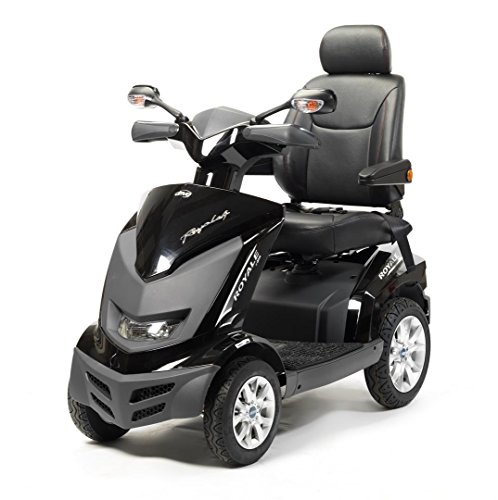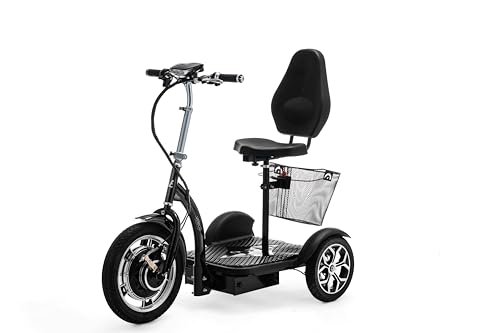Guide To Mobility Scooter Road Or Pavement: The Intermediate Guide On …
페이지 정보

본문
 Mobility Scooter Laws - Where Can I Drive a Mobility Scooter?
Mobility Scooter Laws - Where Can I Drive a Mobility Scooter?Mobility scooters are often the primary mode of transport for seniors. They help them maintain their independence and avoid the need for assisted living. However, it's important to be aware of how to operate a scooter safely and legally.
Class 2 scooters are only allowed to travel at a pedestrian speed (4 4 mph) on pedestrian and pavement areas. If you want to travel further distances, a Road Mobility Scooter is more appropriate.
Safety
Depending on your location, you may have laws that regulate the use of mobility scooters on pavements and roads. These guidelines typically outline specific speed limits and safety guidelines for scooter users. It is important to follow these rules in order to maintain your safety and the safety of pedestrians or other road users. It is also advisable to purchase insurance for your mobility scooter. It is not legally required however it can give you security in the event you get involved in an accident.
Remember that mobility scooters were not designed to drive at high speeds, and they are not able to keep up. It is essential to drive slowly and cautiously when driving on a pavement or road. This includes adhering to the speed limit and yielding to pedestrians. Avoid distractions like headphones and mobile phones while riding a scooter. Avoid driving through roundabouts since they can be dangerous for scooters.
Regular maintenance and routine inspections will also ensure safe operation of your scooter. Examining the batteries, lights and tyres to make sure they're working correctly is an important part of this. It is essential to be aware of potholes, and to develop strategies to avoid them. You can do this by learning about the nature of potholes as well as their hazards, as well as practicing defensive driving techniques.
Dropped kerbs is a good idea for navigating roads and pavements safely. These features help reduce the risk of falling and slipping and also provide increased accessibility for disabled and elderly pedestrians. Using a dropped kerb is particularly beneficial in areas that are crowded with pedestrians because it allows you to turn without worrying about blocking or obstructing foot traffic.
Reporting potholes is important as it improves the condition of local roads. Potholes are often caused by poor drainage, aging asphalt, shrinkage cracking and utility excavations. By reporting these problems, you can you drive mobility scooters on the road help to create a safer environment for all road and pavement users.
Mobility
mobility scooter road or pavement - visit the up coming webpage - scooters are lifelines for individuals who are disabled or physically challenged they can provide them with the freedom to live their lives with greater quality of life. They must be operated in a safe and secure manner, and conformity with the laws which govern their operation. They are classified as class 2 and class 3 vehicles with different speeds and features that make them legal in specific zones.
A mobility scooter for pavement is ideal for people who wish to travel for short distances in closed spaces, such as inside supermarkets or shopping centres. These mobility scooters are designed to operate solely on the pavement and can travel at a speed of 4 mph. They are also able to travel at pedestrian crossings and do not need to be registered or equipped with horns, indicators or indicators. These scooters are lighter and smaller than the mobility scooters of class 3 scooters 3. They are also more compact and easier to store.
In contrast the class 3 mobility scooters are designed for road and pavement usage and can reach a maximum speed of 8mph. These scooters are required to be registered with the Driver and Vehicle Licensing Agency (DVLA) and must be fitted with an indicator and horn. They are able to be driven on the roads but it's not recommended that you drive a scooter at speedy speeds on dual-carriageways.
Both class 3 and pavement scooters come with a range of additional features that will help increase their mobility. For example, most models have comfortable seats and suspensions that ensure a smooth ride. The models are available in various sizes to suit your individual requirements. They can also be adorned with accessories like baskets and crutch holders, and USB charger ports.
It is not mandatory to insure your scooter, but it is recommended for peace of mind. In addition, you might be interested in a breakdown coverage to help with the cost of fixing or replacing a damaged mobility scooter. In addition to these factors it is crucial to be aware of the rules that govern scooters in your locale.
Comfort
Many older people who wish to remain independent find that they can still use a mobility scooter even though they're not able to drive cars. Whether they are visiting friends, going shopping or travelling to their local country ground for a cricket match, they can take in the beauty of the countryside and stay in contact with their family and friends while being fully mobile and secure.
A road mobility or pavement can allow the user to travel more than a typical model for travel. It is also equipped with additional features that increase security and comfort. These models come with seats which can be cushioned, swivelable or even padding to allow the user to get in and out of the vehicle. They also permit the position of the steering wheel to be adjusted to meet the needs of the user. These models also come with indicators, a horn and suspension systems that are built-in and absorb the shock of road bumps.
Most pavement or road mobility scooters for sale mobility scooters can handle moderate hills however they will not be suited for steep hills unless they're specifically designed for this type of terrain. These models are more powerful and come with larger batteries and engines than travel scooters, allowing them to travel more quickly and longer between charges.
As with any motor vehicle it takes time to get used to the operation of a pavement or road scooter. However, the majority of people who are familiar with driving a car or cycling will find this fairly intuitive. Some manufacturers offer training to new users to help them learn the various controls and how they work. It is recommended that anyone who is considering purchasing this kind of scooter should try out several models to determine which is the most comfortable and simple to operate for them. It is also important to check that the controls can be operated comfortably and that the operating levers are set up so they can be operated with both hands. This allows you to continue using the mobility scooter even if your hand is weaker.
Disassembly
For those with limited mobility Mobility scooters are a great way to move around. Many people aren't aware of the rules and guidelines which govern the use of these vehicles. This blog post will address common questions regarding where mobility scooters may be driven, and the responsibilities of drivers.
It's important to keep in mind that mobility scooters aren't motorbike and shouldn't be used on roads. They're not made to keep up with traffic and can cause injuries to other drivers if they're used incorrectly. It's not a good thing to drive your scooter into a mall or shop. These areas are not designed for them and they may cause damage to storefronts, or even hurt the other shoppers and you.
Another aspect to consider is the care of your scooter. Regular inspections and regular maintenance by a professional are essential. This will help prolong the life of your scooter, ensure safety and reliability, as well as minimise damage from potholes. This includes inspecting the tyres and ensuring they are maintained them, as well as making sure that the suspension and shock-absorbers are functioning properly, as well as fixing any issues that might arise.
 It's also an excellent idea to invest in breakdown cover for your scooter, in case it has any issues on the road. While it isn't legally required, it can give you peace of mind and give you confidence that your scooter will be protected in the event of an accident or breakdown. The cost of breakdown insurance varies depending on the provider and the kind of scooter you own. It's worth researching and finding out which insurers provide this service. You can also read independent reviews and read what other scooter owners have to say about this service and insurers. This will allow you to make an informed choice about the breakdown coverage you choose. The best class 3 mobility scooter choice for you will depend on the amount of driving you're planning to do and the distances that you'll travel. Generally, a pavement scooter is the ideal choice for short distances and areas with pedestrians, while if you'll be driving for longer distances, a class 3 mobility scooter could be more appropriate.
It's also an excellent idea to invest in breakdown cover for your scooter, in case it has any issues on the road. While it isn't legally required, it can give you peace of mind and give you confidence that your scooter will be protected in the event of an accident or breakdown. The cost of breakdown insurance varies depending on the provider and the kind of scooter you own. It's worth researching and finding out which insurers provide this service. You can also read independent reviews and read what other scooter owners have to say about this service and insurers. This will allow you to make an informed choice about the breakdown coverage you choose. The best class 3 mobility scooter choice for you will depend on the amount of driving you're planning to do and the distances that you'll travel. Generally, a pavement scooter is the ideal choice for short distances and areas with pedestrians, while if you'll be driving for longer distances, a class 3 mobility scooter could be more appropriate.- 이전글How Honda Civic Car Key Replacement Became The Hottest Trend In 2022 24.11.15
- 다음글7 Simple Secrets To Totally Rocking Your Houston Asbestos Attorney 24.11.15
댓글목록
등록된 댓글이 없습니다.